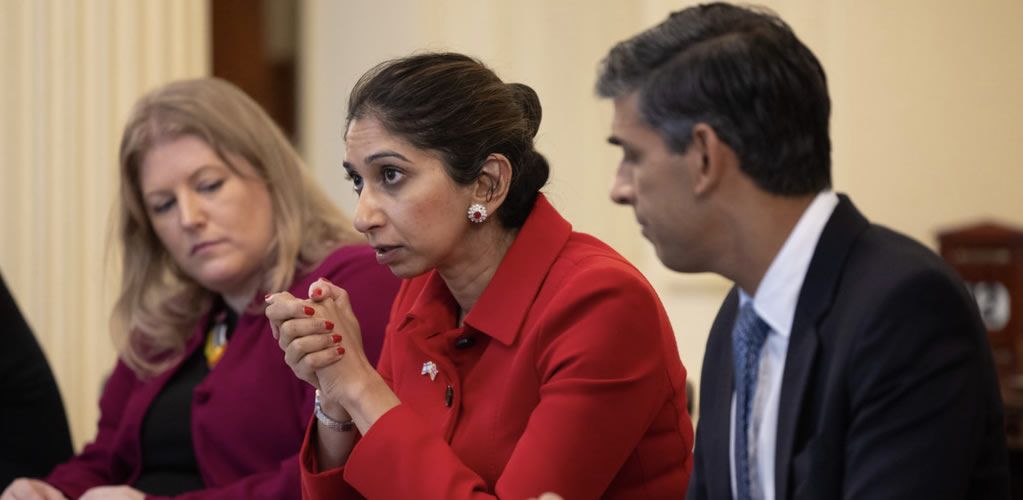The government quietly ditched its plans to help refugees learn English
Suella Braverman’s attack on immigrants followed the government’s failure to deliver the promised strategy to teach English.

Suella Braverman’s attack on immigrants followed the government’s failure to deliver the promised strategy to teach English.
S uella Braverman’s attack on immigrants and refugees “not learning the language” came after the government quietly broke its promise to help people learn English, openDemocracy can reveal.
This week both the home secretary and the deputy chairman of the Conservative Party, Lee Anderson, publicly condemned people for not speaking English after arriving in the UK.
But openDemocracy has discovered that the government ditched its 2018 pledge to publish a strategy to “improve our strategic approach to English language provision”.
At the time, it said this would be “particularly important for people from marginalised groups, who often face the biggest barriers to accessing the English language support they need”.
The Department for Education refused to say whether it still plans to deliver the strategy.
During a visit to Bolton this week, Braverman claimed her recent remarks criticising multiculturalism had been mischaracterised and pointed to people who could not speak English to justify her comments.
She said:
“We have a great multi-ethnic society and in many parts of our country integration has worked. But there are also many towns and cities around the United Kingdom where it hasn’t and communities are living parallel lives.
“They are coming from abroad, they are not learning the language. They’re not embracing British values, and they’re not taking part in British life.”
At a fringe event at the Tory party conference in Manchester, Anderson said he agreed with Braverman that multiculturalism had failed, saying:
“There’s people living on those streets who still can’t speak English after 20 years”.
But earlier this year, education minister Robert Halfon was asked about the potential merits of publishing an English for Speakers of Other Language (ESOL) strategy for England in a parliamentary question by Labour MP Seema Malhotra.
Halfon said that “the department is aware that language skills are crucial to help people integrate into life in England” but would not confirm the status of the strategy previously promised by the government.
Responding to openDemocracy’s findings, Tim Naor Hilton, the chief executive of Refugee Action, said:
“The reality is that refugees and people seeking asylum want to get on with their lives in our communities in peace and safety but it’s the Government’s hostile policies that makes it so hard.
“It could make things easier by increasing funding for ESOL so classes are available from day one, shortages are addressed and wait times are reduced.
“And if the home secretary wants to support people to live better lives in our communities, she must lift the ban on work, end the policy of segregating people in camps, barges and hotels, process asylum claims quickly and fairly, and improve access to education and health services.”
The Department of Education said:
“Work on an ESOL strategy was paused in 2020, while the government focused on the pandemic.”
The government originally promised the strategy would be delivered by autumn 2019.
ESOL is the term used for English language courses taken by people whose first language is not English and who need English to communicate in daily life.
The government covers the full fee for ESOL courses for individuals who are in receipt of Jobseekers Allowance, Employment Support Allowance or Universal Credit – but asylum seekers must pay half of the cost themselves.
Funding for ESOL was cut by almost 60% between 2009 and 2019 in real terms, according to research by Refugee Action published in 2019. The charity also previously found that refugees were waiting up to three years to start English classes.
A report commissioned by then-Prime Minister David Cameron in 2015 found that poor English language skills have “an impact on community cohesion and integration” and “can create further complicating problems for victims of abuse”.
It recommended the government make “sufficient funding available for community-based English language classes”.

GOING FURTHER
Meet your MP -- Lee Anderson | PMP Magazine
Sources:
▪ Text: This piece was first published in openDemocracy and re-published in PMP Magazine on 15 October 2023. | The author writes in a personal capacity.
▪ Cover: Flickr/Number 10. (Licensed under a Creative Commons Attribution-ShareAlike 4.0 International License.)






[Read our Comments Guidelines]